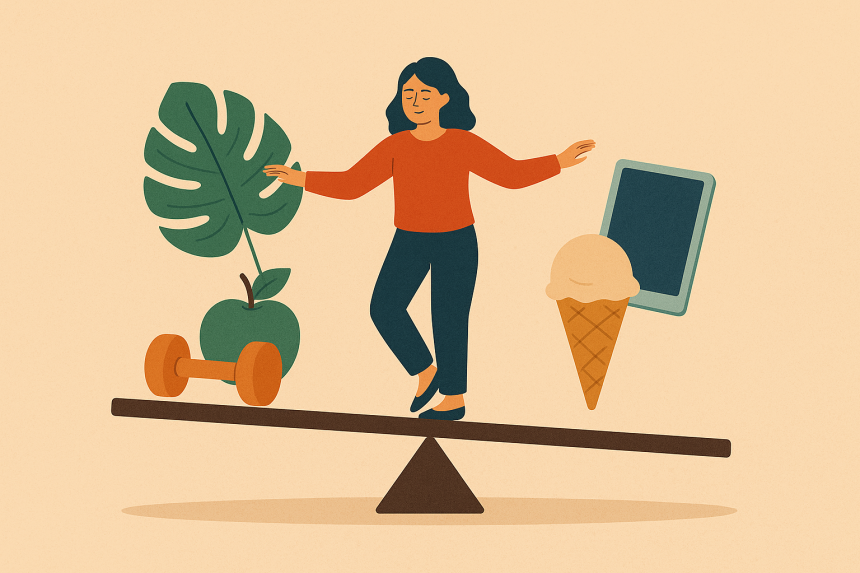For years, wellness was sold like a finish line. Smoothies, skin serums, boutique fitness classes—it all carried a quiet promise that if you just kept optimizing, you’d finally feel whole. But these days, people are letting go of that grind. Wellness is starting to look less like a competition and more like a conversation between the body, the mind, and real life.
The Wellness Pendulum Swings Back
After decades of clean-eating rules, twelve-step skincare routines, and the constant hum of “self-improvement,” burnout hit the wellness world hard. The pandemic didn’t start the shift, but it cracked the illusion that control equals health. People realized you can eat every superfood, track every calorie, and still feel hollow.
Now, wellness has taken a softer turn. It’s about small, sustainable choices that feel realistic. Walks instead of 5 a.m. bootcamps. Meditation in traffic instead of hour-long guided sessions. People are listening to their bodies more, trusting intuition over influencers. It’s not laziness—it’s balance redefined.
Longevity Meets Letting Go
The anti-aging conversation has matured, too. Instead of pretending age can be reversed, people are learning how to age well. Scientists studying longevity talk less about freezing wrinkles and more about protecting cells, joints, and cognition.
That’s where anti-aging supplements enter the discussion—not as a magic bullet, but as one piece of the larger puzzle. Compounds like NAD+, CoQ10, and resveratrol have captured attention for how they may support mitochondrial function and reduce oxidative stress. The key is realistic use. They’re meant to complement movement, rest, and nutrition, not replace them.
The smartest shift might be in mindset. Aging gracefully isn’t about fighting nature. It’s about supporting it. The goal isn’t to look twenty forever, but to feel capable at eighty. That’s a healthier kind of ambition.
Mental Rest As Medicine
For years, people praised productivity like it was a moral virtue. Sleep became optional, rest felt guilty, and the line between “driven” and “depleted” blurred. Now, mental health is finally being treated as part of physical wellness, not a separate issue.
Studies on chronic stress show how cortisol can suppress immune function and even accelerate aging. So rest isn’t laziness—it’s biological maintenance. The body isn’t built to run in constant survival mode. The new idea of wellness respects that your nervous system needs downtime as much as your muscles do.
There’s also a growing interest in what psychologists call “micro-restoration.” Little resets during the day that keep the mind from slipping into overdrive. Stretching for two minutes between emails. Sitting in silence after a meeting. Turning off your camera. The smallest pauses often make the biggest difference.
Healing Without Shame
The conversation about recovery has also grown up. Addiction used to be seen as a moral failure, but that stigma is slowly unraveling. Modern treatment centers focus on rebuilding a person’s life, not reducing them to their diagnosis.
Programs like Betty Ford, Turning Point Recovery and other reputable rehab centers are combining therapy with physical wellness and long-term support systems. It’s not just about detoxing the body—it’s about retraining the mind and rewiring habits that once felt impossible to escape. Many centers now integrate mindfulness, exercise, and nutrition into recovery plans because healing works best when the whole person is addressed.
The truth is, addiction and mental illness can happen to anyone. It’s not a weakness. It’s human vulnerability intersecting with modern stress, genetics, and environment. The new recovery model acknowledges that people don’t need punishment—they need connection.
Reclaiming The Middle Ground
Somewhere along the way, health became about extremes—biohacking, green juice cleanses, “clean” versus “toxic.” But most people don’t live in all-or-nothing worlds. The middle ground is where health actually happens.
Moderation used to sound boring, but now it feels revolutionary. People are realizing it’s possible to care about your health without letting it control your life. You can drink coffee and still meditate. You can skip the gym and still value movement. You can use skincare without chasing youth.
This middle ground is also a quiet rebellion against the noise. It’s choosing to tune out constant advice and tune in to what works for you. Balance doesn’t photograph well, but it feels better than perfection ever did.
Final Thoughts
The wellness world is still evolving, but one thing’s clear: perfection is out, presence is in. People are trading the impossible chase for something more honest. Health doesn’t mean being flawless. It means feeling grounded, capable, and awake to your own needs.
In the end, the real wellness revolution isn’t happening in labs or gyms. It’s happening in the quiet moments when someone decides to rest, to forgive themselves, or to start over again tomorrow. Balance isn’t glamorous, but it’s sustainable—and that’s what makes it powerful.
Lynn Martelli is an editor at Readability. She received her MFA in Creative Writing from Antioch University and has worked as an editor for over 10 years. Lynn has edited a wide variety of books, including fiction, non-fiction, memoirs, and more. In her free time, Lynn enjoys reading, writing, and spending time with her family and friends.














